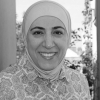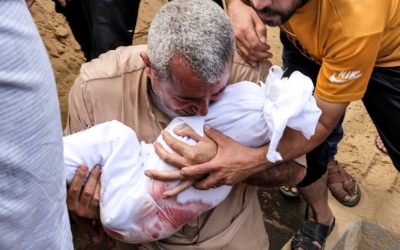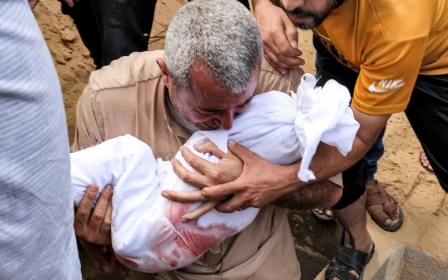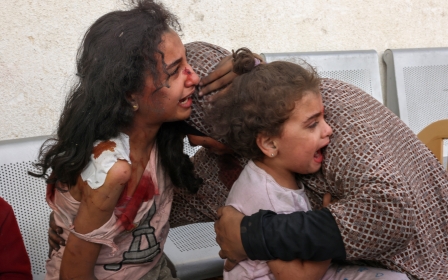Why US mental health associations justify Israel's genocidal attack on Gaza
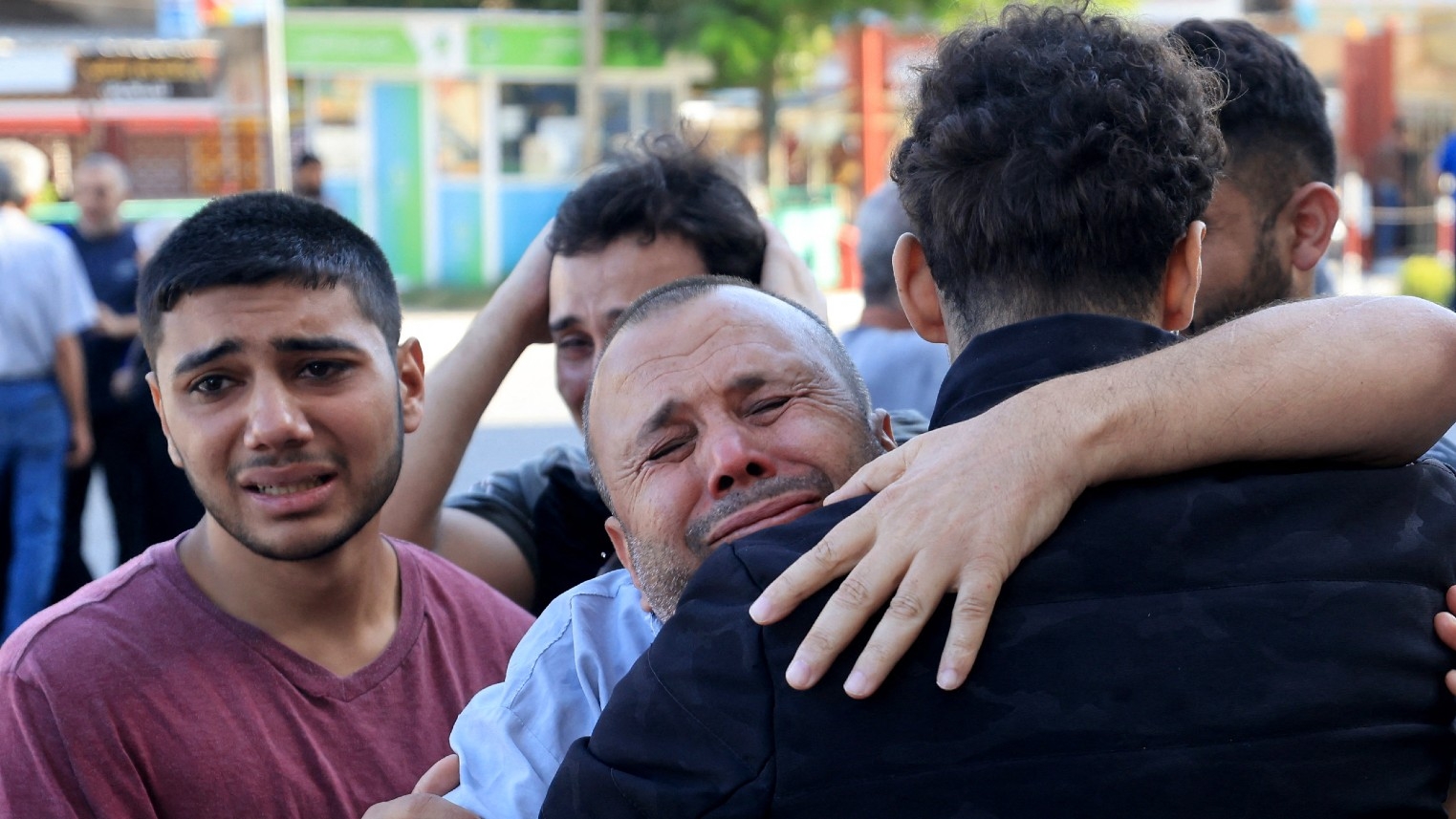
This week, the American Psychiatric Association (APA) issued a statement on the "terrorist attacks in Israel" and the American Academy of Child & Adolescent Psychiatry (AACAP) released a similar response to the "recent attacks and acts of terror in Israel".
As they currently stand, these are disappointingly one-sided condemnations and fail to address Israel's 75-year-long occupation of Palestine and numerous atrocities committed against Palestinians throughout this period.
While the APA portrays Palestinian resistance as antisemitism and terrorism, an occupied people's right to resist is both legal under international law and, like mental health itself, a basic human right.
The appalling imbalance in the stated positions of the APA and the AACAP reflects a dangerous lack of awareness or wilful ignorance of the physical and mental health effects of the occupation, particularly the Gaza siege, on Palestinians.
New MEE newsletter: Jerusalem Dispatch
Sign up to get the latest insights and analysis on Israel-Palestine, alongside Turkey Unpacked and other MEE newsletters
By failing to address the long-term suffering of Palestinians and unequivocally siding with the occupier, the APA and AACAP have violated their own principles of impartiality and neutrality and exposed their lack of commitment to addressing the mental health needs of all people.
Follow Middle East Eye's live coverage for the latest on the Israel-Palestine war
Unequal lives
The statements by the world's leading psychiatric associations neglect the historical context and cast a blind eye to the besieged population in Gaza, half of whom are children. They make no mention of the horrific bombardment of the tiny enclave or what many rights groups are now calling a genocide against Palestinians.
It seems obvious that mental health professionals' concerns should extend to all people equally. Who better than psychiatrists to understand the importance of freedom?
By the same token, the statements totally ignore the psychological impact and trauma of the occupation. Rights groups have documented the inhumane conditions for years, including reports by Physicians for Human Rights, Amnesty International and Save the Children, among others.
In its brutal campaign of collective punishment, Israel has cut off food, fuel, electricity, water and medical supplies, and in what is being described as a second Nakba, has displaced hundreds of thousands of Palestinians who were forced to flee their homes.
One-third of the more than 2,200 Palestinians killed and the nearly 9,000 injured so far in Gaza are children, yet their lives were apparently unworthy of mention by the AACAP.
Even in its half-hearted statement on the current "crisis" in Gaza, the AACAP cannot bring itself to "mourn" the children killed, expressing nothing more than a vague concern for potentially distressing "imagery" to which the children may potentially be exposed.
It is as though young teens were not forced to endure five Israeli wars on Gaza, with massive civilian death tolls, during the last decade and a half.
Beyond the horrific violence, Gaza has been depleted by a crippling 16-year blockade, described as an open-air prison with the highest population density. In the last few days, more than one million people have been ordered by Israel to leave their homes with nowhere to go.
It seems obvious that mental health professionals' concerns should extend to all people equally. Who better than psychiatrists to understand the importance of freedom for human beings - for Palestinians and Israelis alike? Otherwise, the only explanation for such clear double standards is that the APA and AAPAC have adopted wholesale the official Israeli narrative and are unable to see Palestinians as humans.
Dangerous propaganda
The statements further dehumanise Palestinians by ignoring their enduring mental health challenges and collective trauma, resulting from decades of oppression, ongoing violence, humiliation and injustice inflicted by the occupation.
The bombing of Palestinian schools, ambulances and hospitals - including the only psychiatric hospital in Gaza, which took place on Friday morning as I learned from its director and my colleague, Dr Abdullah Aljamal - is but one instance of these chronic harms.
Such statements from medical organisations, which are allegedly not a political lobby, further inflame public sentiment and reinforce dangerous propaganda supporting Israel's genocidal actions towards Palestinians in Gaza. Instead, the APA and AACAP could have done better to confront the vicious lies spread by the US government and media, including the horrific, and since debunked, "beheaded babies" smear.
If these organisations were truly concerned for the well-being of civilians or children, they could have confronted the massive arsenal of US military aid to Israel, which assists Israel in implementing its murderous plans against Palestinians.
Hubristic attitudes
The APA and AACAP would better serve the people of Israel by helping them to shed their hubristic attitudes and sense of entitlement. They could help stem future violence by recognising the legitimate struggle of Palestinians to live in freedom and dignity and recognise that wherever there is oppression, there will be resistance.
A more balanced and empathetic approach is essential, one that acknowledges the mental health struggles on both sides and advocates for a just and peaceful resolution for both peoples. A principled resolution must be based on human rights and international law.
Mental health as a fundamental human right was the theme of the latest World Mental Health Day on 10 October. Working towards global mental health demands a comprehensive and inclusive perspective that truly supports all those impacted by this longstanding and ongoing crisis.
Palestinian psychiatrists and mental health professionals call upon all colleagues, and health and mental health organisations globally, to uphold the ethics of our professional role and not be corrupted by political ideology.
We must push back against the APA and AAPAC and any other professional organisations that contribute to hateful and negative representations of the Palestinian people. Such dangerous statements make them accomplices of the oppression and killing of Palestinians.
The views expressed in this article belong to the author and do not necessarily reflect the editorial policy of Middle East Eye.
Middle East Eye delivers independent and unrivalled coverage and analysis of the Middle East, North Africa and beyond. To learn more about republishing this content and the associated fees, please fill out this form. More about MEE can be found here.


